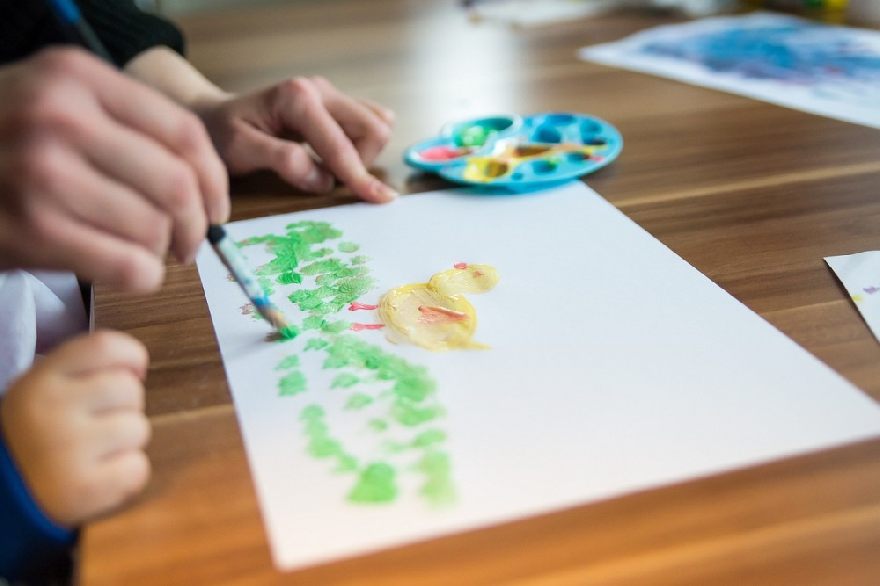KiTa dwarf uprising in Beckum.
The day care center is friendly and suitable for children aged 1-3 years. The childminder looks after the children professionally and offers a variety of activities.
Once a week she does age-appropriate sport with the children. Your physical well-being is also taken care of.
There are many age-appropriate toys in the day-care center. The kids are having fun in education.
Groups of a maximum of 5 children are cared for so that each child receives the attention and education it needs.
In addition, the children regularly take part in excursions and sporting activities.
The childminder looks after the children professionally and thus participates in their upbringing.
Further education and courses are regularly attended by the childminder and are up to date.
A daycare center is a childcare facility that looks after and supervises children while their parents or carers are away. Day care centers typically offer a range of activities and services for children, such as: such as meals, playtime, and educational activities.
A typical day at a daycare center may include the following activities:
Arrival and drop-off: Children and their parents or carers usually arrive at the daycare center in the morning and the children are brought with the staff.
Morning routine: Children can participate in a variety of activities in the morning, such as B. free spins, group activities and organized games.
Lunchtime: Children are usually served a nutritious lunch at the daycare, which may include a main course, a side dish and a drink.
Sleep time: Many daycare centers have a set sleep time for children to rest and recharge.
Afternoon Activities: In the afternoon, children can participate in activities such as outdoor games, arts and crafts, and educational games.
Snack time: Children are usually offered a snack in the afternoon, e.g. such as fruit or crackers.
Pickup: At the end of the day, parents or carers come to the day care center to pick up their children.
Day care centers provide a safe and stimulating environment for children to learn and grow while their parents or carers are away.
They typically have trained staff responsible for the care and supervision of children and are equipped with resources and materials to support children's development.
Educational activities.
As a childminder in a day care center there are many educational activities that you can engage in on a daily basis. These activities are designed to provide children with a safe and stimulating environment in which to learn and grow.
Some of the educational activities that a daycare nanny can participate in include:
Story Lesson: Reading stories to children is a great way to help them develop their language skills and imagination. You can read stories to children individually or in a group.
Arts and Crafts: Participating in arts and crafts activities can help kids develop their fine motor, creativity, and problem-solving skills. You can provide children with various materials such as paint, glue, scissors and craft paper to create their own artworks.
Outdoor Play: Children benefit from spending time outdoors, and participating in outdoor play activities can help them develop their physical and social skills. They can take children to a nearby park or playground, or organize outdoor activities in the daycare's backyard.
Music and Movement: Participating in music and movement activities can help children develop their gross motor skills and creativity. They can guide children in singing and dancing activities, or provide them with instruments such as drums and maracas to play withset.
Educational Games & Activities: You can provide children with educational games and activities designed to teach them important skills like counting, colors, and shapes. These activities can include jigsaw puzzles, matching games and educational toys.
By engaging in these and other educational activities, you can help children learn and grow in a safe and stimulating environment.
Best food.
Organic food is food that is produced using methods that do not use synthetic chemicals such as pesticides and fertilizers. It is grown in a way that promotes the health and wellbeing of söl;oil, plants, animals and people.
In a daycare center, providing children with organic food can have many benefits. Potential benefits of serving organic food to children in a daycare center include:
Improved Health: Organic foods often contain more nutrients and fewer contaminants than non-organic foods, which can lead to better health outcomes for children.
Organic Sustainability: Organic farming methods are more sustainable and environmentally friendly than traditional farming methods, which can help conserve natural resources for future generations.
Animal Welfare: Organic animal products are often produced using higher animal welfare standards, which may be important for some families.
Some examples of organic foods that can be served to children in a daycare center are:
Fruits and Vegetables: Organic fruits and vegetables can be fresher and tastier than their non-organic counterparts. They can be served raw as snacks or incorporated into meals such as salads and smoothies.
Dairy: Organic milk, cheese and yogurt can be served as snacks or used in recipes such as macaroni and cheese or yogurt parfaits.
Meat and Poultry: Organic meat and poultry can be served as part of a balanced diet in dishes such as chicken nuggets or turkey sandwiches.
Grains: Organic grains like rice, quinoa and oats can be served as part of a balanced meal or used in recipes like oatmeal or rice bowls.
By offering organic food to children in a daycare center, you can help promote their health and well-being while supporting environmentally responsible and humane farming practices.

Your childminder in Beckum.
Your childminder Kamilla Poschadel takes care of her with a lot of funß around the children; and very affectionate.
The little ones play and learn a lot up to the age of about 3 years at the dwarf rebellion daycare center.
Children learn through play and develop much better when activities are also offered.
For example, once a week the childminder takes the little ones to a sports hall so that the little ones can let off steam.
Artistic training is also provided, so the children can do a lot of handicrafts and painting.

